KUALA LUMPUR, Oct 16 — Chef Nobu Matsuhisa is a figure that hardly needs an introduction, but one almost always follows.
At 76, his eponymous empire spans more than 50 restaurants and over 40 hotels in more than 20 countries.
He’s often credited with reinventing the way the world eats sushi, first in Los Angeles and New York, then everywhere else. But don’t just take my word for it.
In Nobu, a documentary centred on his life released earlier this year, Ruth Reichl, former restaurant critic for The Los Angeles Times and The New York Times, says, “There are a handful of people who have changed the way the world eats. Nobu is certainly there in that pantheon of game changers.”
“Ruth, talking about me? I’m so honoured,” Matsuhisa told me.
“The first time I met her was 30 years ago. I was a little scared, because The New York Times was the biggest newspaper, and she was the food critic.
“I didn’t even know she was interviewed for my documentary! I’m so honoured she mentioned me. But I’m not looking for titles, I’m not looking for a legacy or something.
“Always, my end goal is: can someone come to the restaurant and enjoy good food? Enjoy the service?”
Matsuhisa was in Kuala Lumpur to celebrate the 10th anniversary of Nobu Kuala Lumpur.
The group’s first South-east Asia outpost, it opened in Menara Petronas 3 in 2015 before relocating to Four Seasons Place in 2021.
Commenting on the move, he said, “I felt it was too high. There’s no security here – back then, you had to go through security, no kids were allowed – it’s not Nobu’s way, you know?
“Nobu’s way is for people to just come, enjoy and relax. I’m very happy we moved here.”
At a glance, this casual approach might sound antithetical to a brand that firmly wields the glitz and glamour of Hollywood as part of its identity.
After all, his first restaurant, Matsuhisa, was located in Beverly Hills and was regularly patronised by Hollywood A-listers, including future partner Robert De Niro.
But simplicity is key, Matsuhisa insists, especially when it comes to his food.
“I’m not looking to change my ways. I’m always looking for something quality, simple, clean, beautiful and tasty. This is Nobu’s basic concept.”
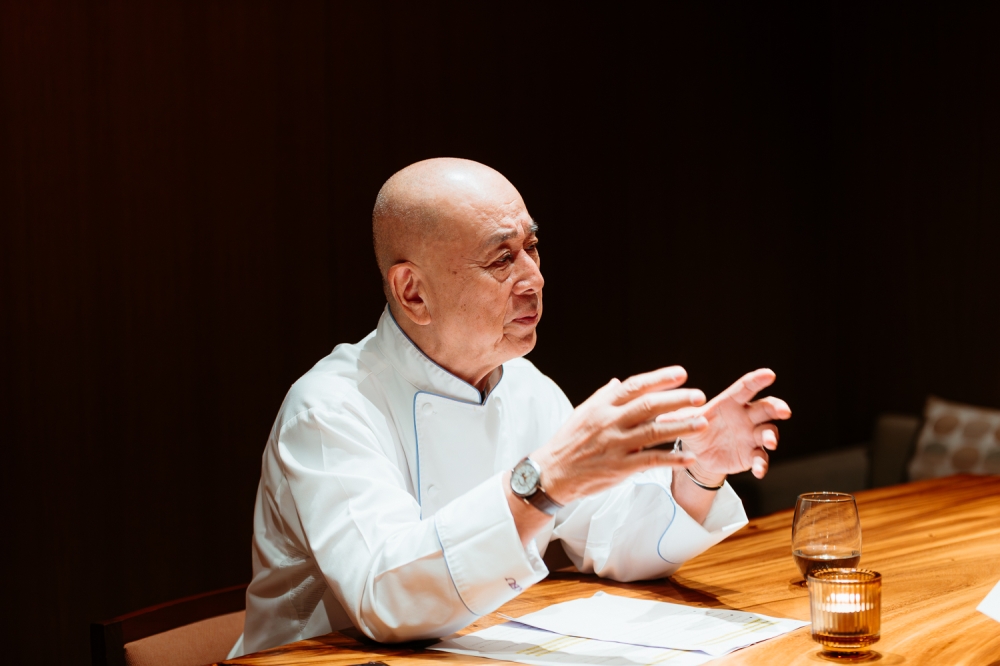
Nobu Matsuhisa’s significance is larger-than-life, but he insists that he isn’t ‘looking for a legacy’. — Picture by Raymond Manuel
That philosophy carries through to the dishes that have come to define Nobu’s cuisine, deceptively simple plates that balance refinement with approachability.
Among them, few are as iconic and enduring as the miso black cod and yellowtail jalapeño.
He recalls conceiving the latter while cooking with five other chefs at a charity dinner in Maui.
“At the end of the party, all the guests left, and it was time for the chefs’ afterparty. We needed some food, so I looked at my leftover yellowtail. I put them in a bowl, sliced the jalapeños, chopped some cilantro, lemon juice and soy sauce and mixed them together.
“Each chef went, ‘Oh, that’s great’, and the next day I was back in Los Angeles talking to my team about the dish.”
The dish became one of Nobu’s signatures, and Matsuhisa says that’s down to one thing.
“Yellowtail jalapeño is so simple, it’s just sliced jalapeño, cilantro and so on, it’s so simple, but people love it. I have a five-year-old grandson, and he likes yellowtail jalapeño too, but no jalapeño – just fish and sauce, it’s tasty and simple.”
Other signature dishes came directly as a result of Matsuhisa’s willingness to listen to customers, a quality that no doubt endeared him to the bigwigs in Los Angeles and later New York.
“I’m always looking at the customer side of things. Yes, I have a lot of experience and technique, but when I create something, communication comes first.
“When the customer comes, ‘What do you like? How do you feel?’, then, inspiration comes from their answer.”
In the documentary, he recalls creating his new-style sashimi after a diner refused to eat raw fish back in the early days – a testament to just how long he’s been doing this.
“A lot of chefs are looking to create new dishes, but sometimes for me, it’s too complicated, too much thinking. That’s why the Nobu way is about keeping it simple and quality.”
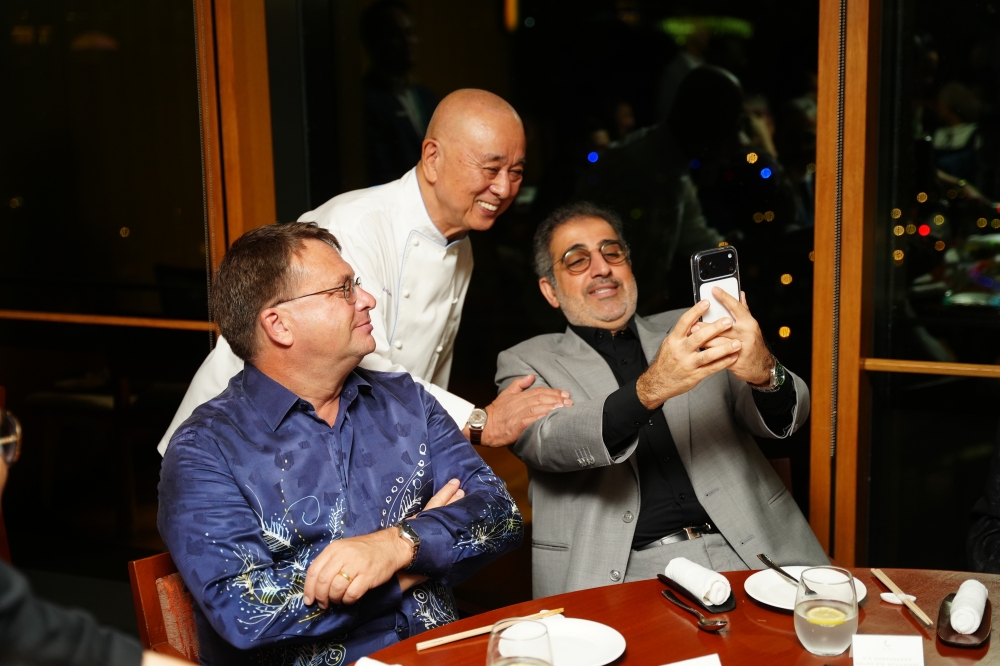
Nobu Matsuhisa’s keenness to listen to customers informed some of his signature dishes, such as the new-style sashimi. — Picture courtesy of Nobu Kuala Lumpur
That Nobu way extends far beyond the food.
It’s how Matsuhisa has grown from a single restaurant in Beverly Hills to an empire spanning continents, held together by a network of chefs who have worked alongside him for decades.
“We have good teams, like the corporate chefs that travel with me; a lot of them have worked for 20 years with me. So they know the Nobu quality, they know the taste, and they know what they have to do. It’s like growing a family.”
That family includes the team at Nobu Kuala Lumpur, whom Matsuhisa speaks of with clear pride.
“I’m so happy to see people and the team growing. At the beginning, it’s little by little, and now, they know how to do things the Nobu way.”
The Kuala Lumpur team, like every Nobu around the world, draws on local produce wherever possible – a reflection of Matsuhisa’s belief that food should connect to the place it’s made.
“We use local products as much as possible, because restaurants are not just about making money; we have to support local people, local ingredients, and collaborate with the local culture of food.”
That connection between place and plate traces back to his early years in Peru, where he first began to adapt Japanese techniques to local ingredients.
“Almost 50 years ago, I was in Peru,” he recalls.
“At that time, nobody knew Peruvian food, nobody knew ceviche. Now, ceviche is all around the world. Even in Kuala Lumpur, there’s a lot of spice in the food, but if I stayed here for a couple of years, I’d like to create something combining both cultures.
“For me, it’s a lot of fun, and I like to support the local community and local people and culture of food.”
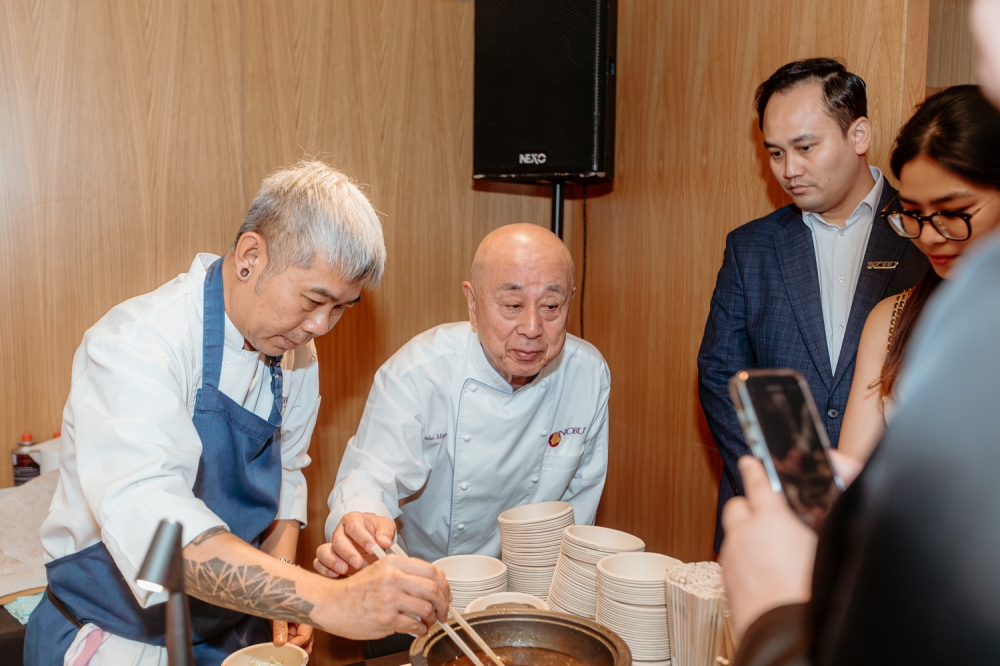
Nobu Matsuhisa (centre) prepares dishes with his team during Nobu Kuala Lumpur’s 10th anniversary celebration. — Picture by Raymond Manuel
For Matsuhisa, it has always come down to people, whether in the kitchen or in business.
That instinct guided his relationship with Robert De Niro, who first approached him about opening a restaurant in New York just a year after he launched Matsuhisa in Beverly Hills in 1987.
“At that time, I wasn’t ready to go,” he recalls.
“De Niro was asking me in 1988. Just one year had passed. Even though it was a small restaurant, I didn’t want to be rushed because before that, in Alaska, my restaurant caught fire after 50 days and it burned down – I almost tried to kill myself. I wanted to go one by one, step by step.”
De Niro, however, kept coming back, quietly over four or five years.
“He kept coming to the restaurant, but never asked again,” Matsuhisa says.
“Then one day he called me on my home phone and said, ‘Hey Nobu, I’ve been watching over you. Now you look organised very well.’ I was so surprised, because he’s a big star, a big Hollywood person, but he was not looking for business – he was watching over me. Oh, I can trust him.”
That trust became the foundation of a friendship and partnership that has lasted more than 30 years and grown into a global brand.
“Before, I had partners in Alaska and Peru, but they were just looking for money,” he says.
“That’s why I had no partner at Matsuhisa, I was very comfortable. Now, knowing that Bob had been watching for four, five years, finally I decided I can trust him. That’s why we are still good friends and good partners for over 30 years.”
Even now, Matsuhisa insists he isn’t looking too far ahead.
“Well, I’m not looking for the next step. Always, in this moment, I like to try my best,” he says.
“It’s been 38, almost 39 years since I opened my first restaurant, and I never thought about where I’d be today. Nobu now has almost 60 restaurants and 20 hotels around the world, even Matsuhisa has 12 locations.”
“Seriously, I feel so good. I’m also so proud of my team. I think restaurants, even hotels, are easy to open. You know why? Because you just find the location, find the money, it comes together beautifully. But after opening the restaurant or hotel, who’s running it? People.
Nobu restaurants now, a lot of people ask us to open in many different countries, different cities. But for me, staff comes first. Product comes first. That’s why in the last 10 years, KL has been getting better and better, you know, step by step.”
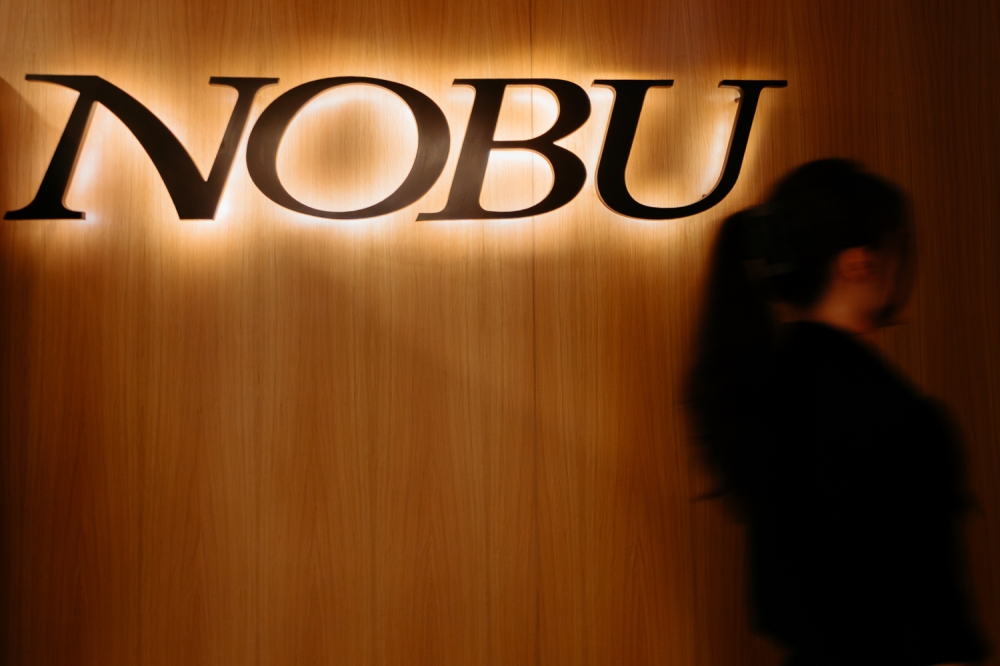
Nobu Kuala Lumpur is the group’s first South-east Asian outpost, and it celebrated its 10th anniversary this year. — Picture by Raymond Manuel
Nobu Kuala Lumpur
L4A-05, Level 4A,
Shoppes at Four Seasons Place
145, Jln Ampang, Kuala Lumpur
Open: 11.45am to 2pm, 6pm to 10pm
Tel: 03-23800028
Website @noburestaurants.com
* Follow us on Instagram @eatdrinkmm for more food gems.
* Follow Ethan Lau on Instagram @eatenlau for more musings on food and mildly self-deprecating attempts at humour.

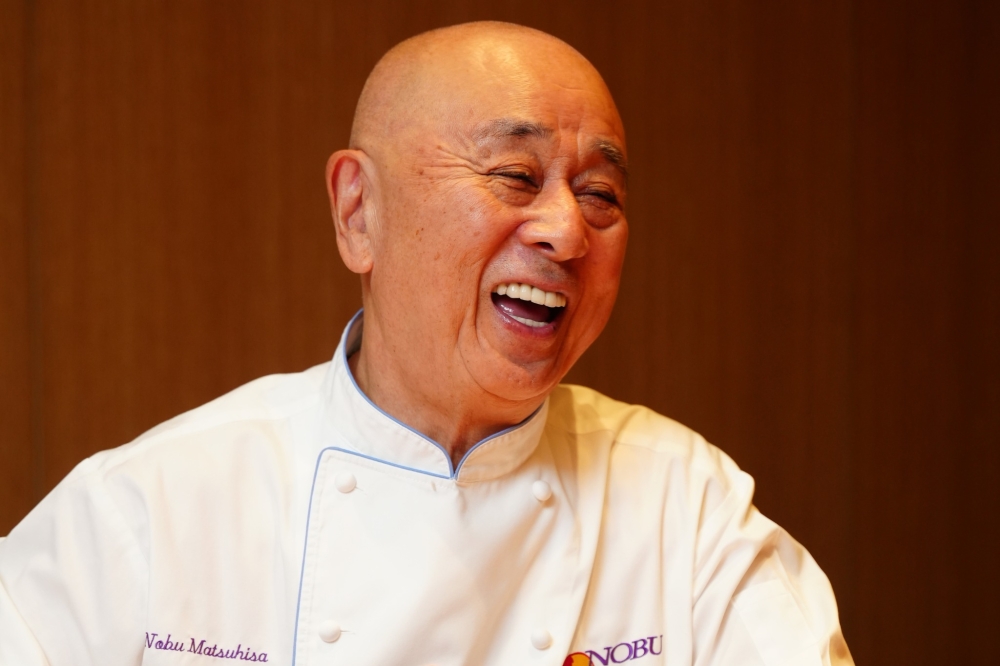
Dining and Cooking